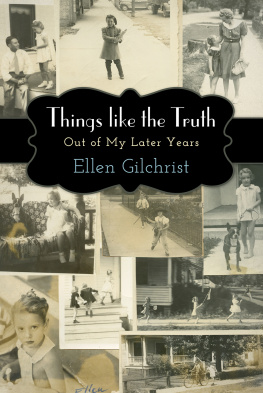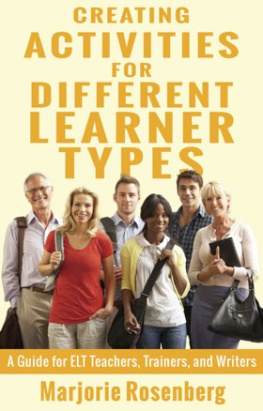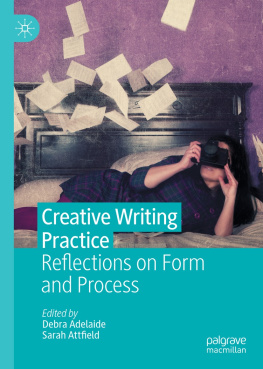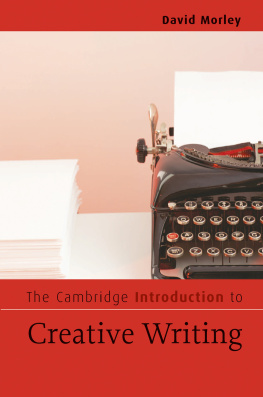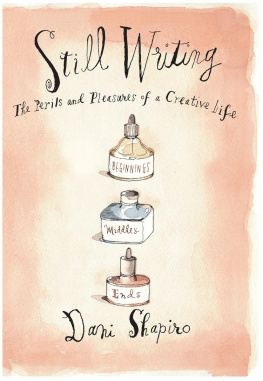The Writing life
The Writing Life
Ellen Gilchrist

www.upress.state.ms.us
The Undertaking on page 35 reprinted courtesy of Louise Glck.
The University Press of Mississippi is a member of the Association of American University Presses.
Copyright 2005 by Ellen Gilchrist
All rights reserved
Manufactured in the United States of America

Library of Congress Cataloging-in-Publication Data
Gilchrist, Ellen, 1935
The writing life / Ellen Gilchrist.1st ed.
p. cm.
ISBN 1-57806-739-1 (cloth: alk. paper)
1. Gilchrist, Ellen, 19352. Authors, American20th century
Biography. 3. Creative writing (Higher education) 4. Authorship.
I. Title.
PS3557.I34258Z477 2005
813.54dc22 2004022120
British Library Cataloging-in-Publication Data available
For Carolyn, who is a fan of all things beautiful and true and kind and Zen and hopeful
He is called a writer, not he who writeth in measure only but he who fayneth and formeth a fable and writes things like the truth.
BEN JOHNSON
CONTENTS
PREFACE
This book was inspired by young people. Many of the best essays were dragged out of me by young magazine editors. They would ask me to write about something like balancing life and work or quitting drinking and I would agree and write a superficial piece about the subject. Then the young editor would beg and cajole me to dig deeper and tell more and think harder and I would reluctantly go back to work.
The essays about learning to teach writing were inspired by the two hundred or so students I have had in my care for the last four years. I learned as much from them as I taught them, maybe more. These essays are field notes, as I soldiered on into unknown territory.
The organization of the book is the work of my editor, Craig Gill, who took three hundred pages of manuscript and carved a book from it. I cannot thank him enough for his help.
What else should I say in a preface? Life is short, seize the day, live in the present, commit random acts of kindness and senseless acts of beauty, lighten up, come along, lets take some words for a walk.
Part One: Life
The Middle Way
MAYBE YOU HAVE TO WAIT for happiness. Maybe the rest is only words.
When I was a child I had a book about a small boy in Scotland whose father was a Highlander and whose mother was a Lowlander. All his life they argued in his presence about whether he was a Lowlander or a Highlander and each tried to persuade him of their case.
In the winters they lived with his mothers people and farmed and cared for domestic animals. In the summers they stayed in the Highlands with his fathers people and he hunted the high hills with his father and his uncles. He was a strong boy and the altitude caused him to grow powerful lungs. When he called the goats and cattle on his mothers farm his voice rose above the rest. In the hills he sometimes stood and called out across great distances to the other hunters. So he grew until he was almost as tall as a man.
The year he was sixteen, as they were making their way from the Highlands to the Lowlands, they came upon a man sitting on a rock playing bagpipes. The boy had never heard such heavenly music. He begged his parents to let him stay and learn to play bagpipes. Finally, when the man agreed to teach him, his parents left him there. And there he stayed the rest of his life, halfway between the Lowlands and the Highlands, playing beautiful music and looking up and down at the worlds he had left behind. Because his lungs were strong from working on the farm and climbing in the hills he was able to make music so fine it could be heard from miles away.
I loved that story the most of anything I had ever read. I can still see each page of the book in my minds eye and I think I have finally found a place between the worlds where I can live in peace and do what I was meant to do. The middle way, the Zen masters call it. Ever since I first heard of that I have known that is what I am seeking.
Family and work. Family and work. I can let them be at war, with guilt as their nuclear weapon and mutually assured destruction as their aim, or I can let them nourish each other. In my life, as I have finally arranged it, the loneliness of being a writer and living alone in the Ozark Mountains is balanced against the worry and control issues of being a mother and a grandmother. I move back and forth between these two worlds. Somewhere in the middle I play my bagpipes and am at peace.
Of course, it wasnt always this easy. I have written two books of poetry and eighteen books of fiction about the struggle to free myself from my family and my conditioning so I could write and live as an artist with a mind that was free to roam, discriminate, and choose. I will leave the details of that struggle, which included four marriages, three Caesarean sections, an abortion, twenty-four years of psychotherapy and lots of lovely men, to your imaginations and go on with the story of where I landed, on this holy middle ground which I dont feel the need to fortify or protect, only to be grateful for having, as long as my destiny allows. I tell myself I am satisfied to be here now, but, of course, I would fight to keep my life if I had to, with sharp, number-two lead pencils and legal pads, my weapons of choice for all battles.
Still, I dont remember the events of my life as a struggle. I think of myself as a thinking, planning, terribly energetic competitor in games I believed I could win. Its all perception. If I cried I thought of the tears as some sort of mistake. Later, I learned that tears are unexpressed rage. My father was a professional baseball player until I was born. At our house we had no respect for crybabies. We believed in channel swimmers and home run kings and people who learned to walk after they had polio. My daddy set the bar high. He taught me it didnt matter if you won or lost, it was how you played the game.
Practically speaking I have worked it out this way. Part of the time I live on the Gulf Coast near my family and participate in their lives as hard as I can. I dont change my personality to do that. I am a bossy, highly opinionated person and I say what I think. On the other hand I love them deeply and help them in every way I can. They dont have to ask for help. I see what is needed and I act.
Then, when I have had enough of trying to control the lives of people just as willful and opinionated as I am, I drive back up to the Ozark Mountains and write books and run around with writers, artists, photographers, fitness experts, professors, and politicians. Sometimes I stay away from the coast for months and dont even think about my family unless they call me. If they need me I am here.
Because I dont like to fly on airplanes or stay in hotels I have to make the life I live in Arkansas as rich as I can figure out how to make it. If I have a good life here I can leave my children alone to live their lives without interference. I want to help them but I dont want to need them.
Two years ago I decided I was getting stagnant so I asked the university here to give me a job teaching writing. I had never taught but I thought I would be good at it. I wanted to be with younger people who were not related to me. Also, it was the year my oldest grandson went to college, a rite of passage for both of us. I think subconsciously I wanted to be with other young people who were experiencing what he was. I have always participated very deeply in his life. Perhaps teaching at a university was one more way of staying near him. So, now, to add to my happiness, I am teaching. What I do aside from that is get up at dawn every day and run or walk or work out at the health club. I love endorphins and I love to write and I love to read. I read and read and read. I live like a nun. I eat only fresh vegetables and high protein foods. I drink only water and coffee. I have a group of friends who come over on Sunday afternoons and read the plays of William Shakespeare out loud. Weve been doing that for fifteen years. Talk about bagpipes, this is the World Series of intellectual endorphins.
Next page

